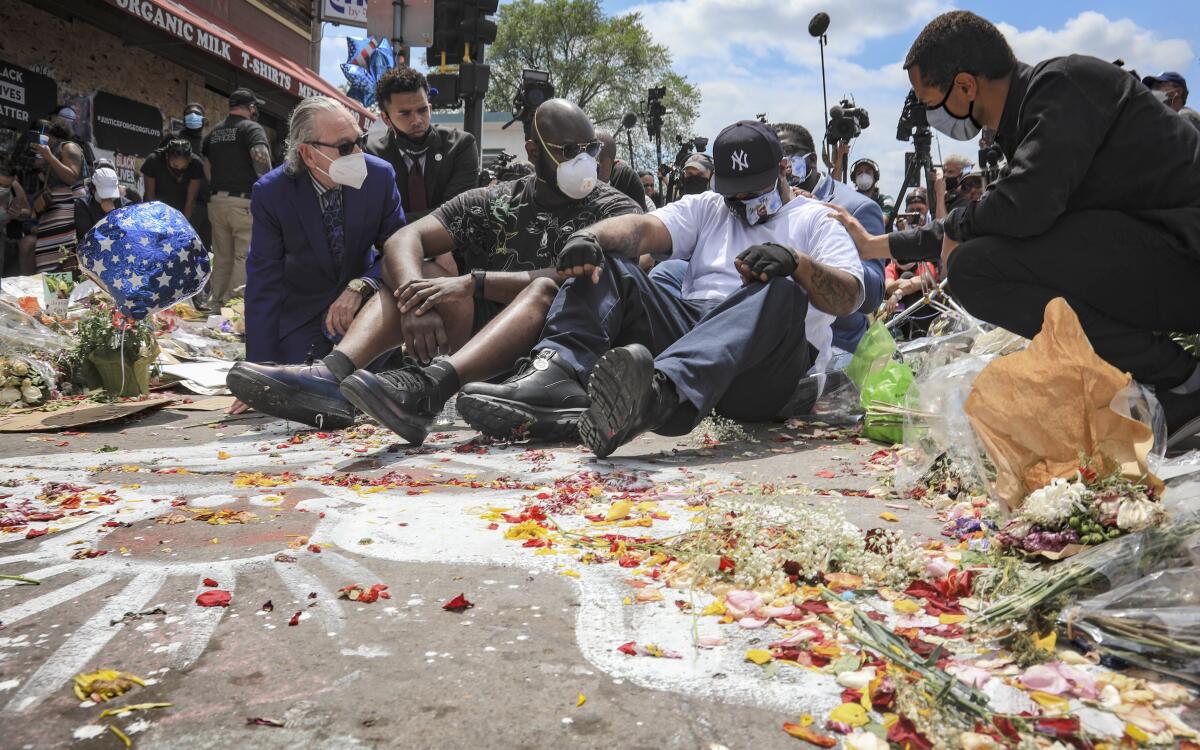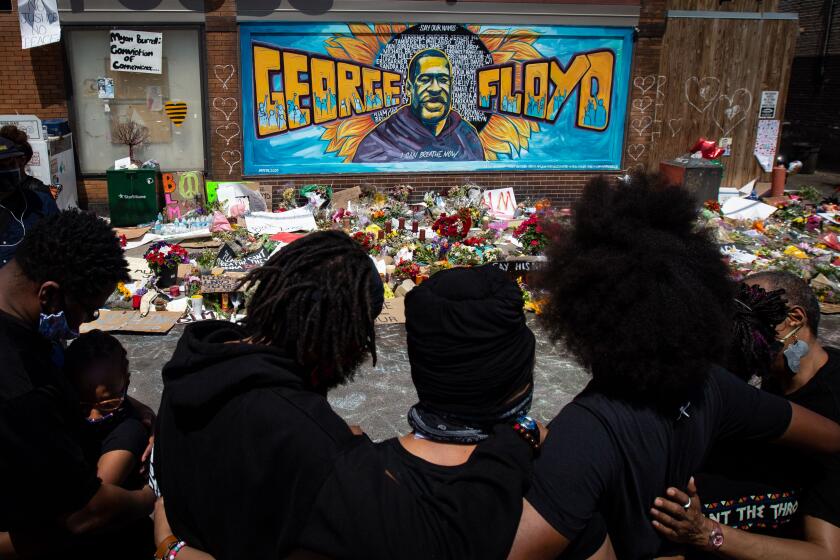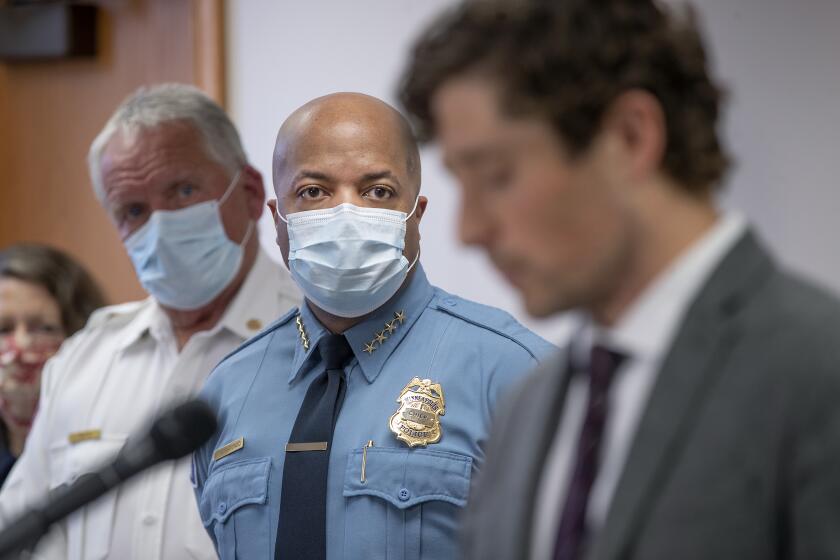Plan advances to allow dismantling Minneapolis Police Department

- Share via
MINNEAPOLIS — The Minneapolis City Council on Friday unanimously advanced a proposal to change the city charter to allow the police department to be dismantled, following widespread criticism of law enforcement over the killing of George Floyd.
The 12-0 vote is just the first step in a process that faces significant bureaucratic obstacles to make the November ballot, where the city’s voters would have the final say. It also comes amid a spate of recent shootings in Minnesota’s largest city that have heightened many citizens’ concerns about talk of dismantling the department.
The proposed amendment, which would replace the police department with a new “Department of Community Safety and Violence Prevention” that has yet to be fully defined, next goes to a policy committee and to the city’s Charter Commission for a formal review, at which point citizens and city officials can weigh in.
“I hope that the Charter Commission will recognize the moment that we are in and take our offer of support, however we can provide it, to expedite this process so that voters have a chance to have their voices heard on this important question and this important moment in our city’s history,” Council President Lisa Bender said before the vote.
The Minneapolis force has come under heavy pressure since Floyd, a Black man in handcuffs, died May 25 after a police officer pressed his knee on Floyd’s neck for nearly nine minutes. Activists have long accused the department of being unable to change a racist and brutal culture, and earlier this month, a majority of the council proclaimed support for dismantling the department.
Councilman Jeremiah Ellison said after the vote that the charter is one of three major barriers to “transformative public safety,” along with the city’s police union and the Minnesota Legislature. The charter — which requires the city to have a police department of a certain size — is the one thing the City Council has a say over, he said.
Minneapolis is beginning to grapple with its racial injustices past and present amid the George Floyd protests.
According to draft language posted online, the new department “will have responsibility for public safety services prioritizing a holistic, public health-oriented approach.”
The amendment further said the director of the new agency would have “non-law-enforcement experience in community safety services, including but not limited to public health and/or restorative justice approaches.” It also provides for a division of licensed peace officers who would answer to the department’s director.
Councilman Phillipe Cunningham said the council is committed to a yearlong community process to determine how the new agency would work. “We are not starting from scratch. We are not starting with a completely blank slate,” he said, pointing to changes meant to prevent violence at other law enforcement agencies across the country.
Ten years from now, Councilman Steve Fletcher predicted, everybody will be looking to emulate the Minneapolis model.
“The path that we’re going to chart will steal the best ideas from everywhere and combine them in a way that is uniquely appropriate to our city,” he said.
The board of the city’s police union called the move “irresponsible” without a clear plan for what comes next.
“Politicians are good at making promises, but not at following through on them, and voters should be wary of any promises that delivered by the City Council about how they will figure it out when and if the charter amendment passes,” it said in a statement.
Some activists against police brutality were displeased too. The Twin Cities Coalition for Justice for Jamar, named for a black man who died in a 2015 confrontation with police, said the amendment would leave power in the hands of the council and mayor’s office, which it said have already failed. The coalition wants the department under community control via a new elected civilian council with the power to hire, fire and prosecute officers.
Many hoped Minneapolis’ first black police chief could reform a department that critics say too often uses excessive force against people of color.
Civil rights attorney Nekima Levy Armstrong, a sharp critic of the department, said the move is premature and counterproductive to building trust with the Black community amid the current uptick in crime.
“There are a lot of people in the African American community who are anxious, who are fearful, who are concerned about the irresponsibility of the Minneapolis City Council and the failure to articulate a clear plan of action on what to expect, and they want an opportunity to weigh in on that,” Armstrong said.
Council members who support the change wanted to seize on a groundswell of support for significant policing changes following Floyd’s death. If they don’t get the charter change on the November ballot, their next chance won’t come until November 2021, they say. The measure faces some time pressure to be finalized and clear a potential mayoral veto in time to make this fall’s ballot.
Mayor Jacob Frey, who opposes abolishing the department, said he’s concerned by the draft amendment.
Frey said when something goes wrong now, the chief and the mayor are accountable. Under the new plan, which would have the council appoint a director of the new agency, accountability would be spread among 14 people. Frey, who has said he supports deep structural changes in the existing department, questioned whether policing practices would vary based on the ward or other factors.
Suad Mire, 30, a receptionist at a mental health clinic, said she’s “very torn” between supporting dismantling the police and whether reforming the existing department should be the path toward significant change. Mire said she wants to see an end to police brutality but doesn’t know if a society can function without law enforcement. She fears a reduced presence by officers citywide may lead to an increase in violence.
“I just feel like they should be better trained, have new officers and their training should be at least a little longer ... and if a police officer that lives deep down in the suburbs, if they’re going to work in the city, then they should know the surroundings and the civilians that are from that city and protect them,” she said. “But I’m not sure about dismantling them.”
More to Read
Sign up for Essential California
The most important California stories and recommendations in your inbox every morning.
You may occasionally receive promotional content from the Los Angeles Times.















